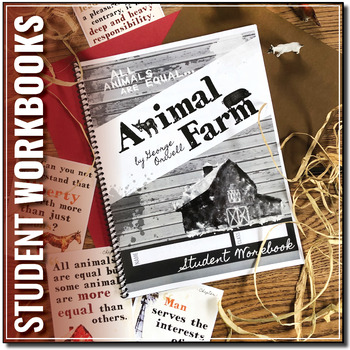Animal Farm by Orwell: Student Workbooks
- Zip
What educators are saying
Also included in
- Daily detailed lesson plans, unit overview, student workbooks, printable materials, engaging posters: all you need for teaching Orwell's Animal Farm. This iconic novel is taught year after year in classrooms around the world, and for good reason! You may be teaching this text for the first time, orPrice $22.38Original Price $27.97Save $5.59
Description
34 unique graphic organiser pages for George Orwell's Animal Farm! These Animal Farm workbooks/worksheets may well change the way you teach the novel and have your students excited to study George Orwell's classic!
**************************************************************************
**DIGITAL VERSION** Because of the move to online instruction due to Covid-19, I have made a Google Slides Version of this workbook, a link to which is now included. However, please note that they were not originally designed to be used digitally. The best and most effective way to use them is in their pen-to-paper, print-based form.
**************************************************************************
Do you ever get bored teaching literature by just reading the text and then doing comprehension questions? I did, and so did my students. Thus these workbooks were created. They are intended to help students think outside the box, to provide them with lots of note-taking opportunities, to help reinforce key concepts through creative means and to provide meaningful engagement with the text.
PRODUCT CONTENTS
1 x Instructions for Use
1 x Student Workbook
1 x Teacher’s Answer Book
WORKBOOK CONTENTS
Thinking about Key Topics
Terms and Concepts
Background Information & Context
Essential Questions
Chapter Summaries
Chapter One
Chapter Two
Chapter Three
Chapter Four
Chapter Five
Chapter Six
Chapter Seven
Chapter Eight
Chapter Nine
Chapter Ten
Analyzing Key Topics
Important Quotations
Writing About Themes
Notes, Doodles, Ideas
(Each workbook has 34 unique pages, and there is a full, detailed ANSWER version)
Please do check out the PREVIEW for more information and pictures.
*Please Note: This is a DIGITAL download.*
Looking for other LITERATURE WORKBOOKS?
- The Outsiders
- Fahrenheit 451
- The Great Gatsby
- Of Mice and Men
- To Kill A Mockingbird
- Lord of the Flies
- Macbeth
- Romeo And Juliet
- The House on Mango Street
- Twelfth Night
- The Giver
- Pride and Prejudice
If you are looking for more Animal Farm resources, you may like these:
- Animal Farm Lesson Plan Pack: A complete unit with pacing guide, daily lesson plans, worksheets, slideshows, and more!
- Animal Farm Posters: A set of posters with quotations from the novel. A great way to visually reinforce key lines from the text, and to brighten up your classroom walls.






